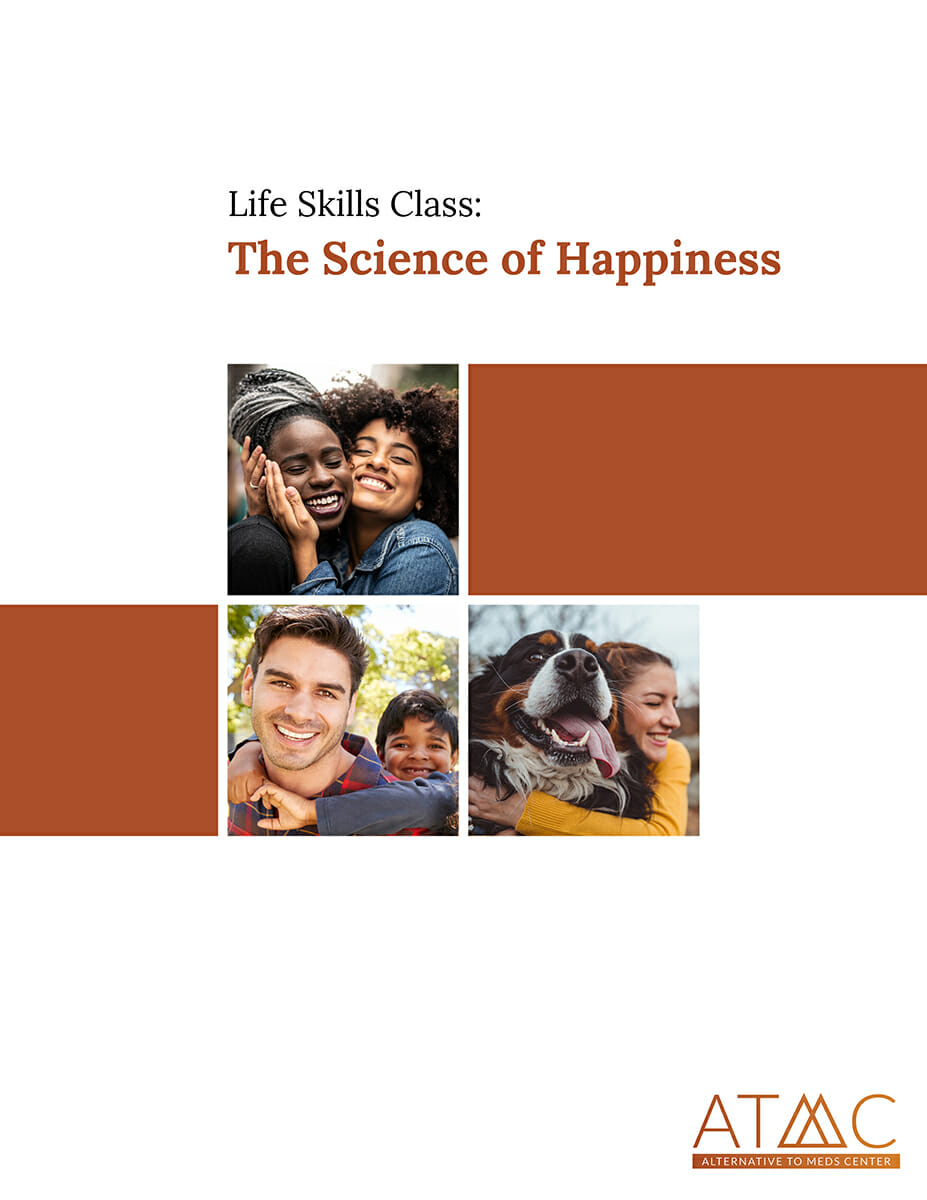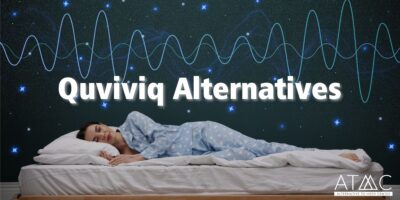Written by Lyle Murphy
Table of Contents:
We believe that by and large, people are over-medicated and assigned a mental diagnosis that conveys a belief that something is permanently wrong with them. To our mind, there is a lot more involved in mental health and addiction treatment.
It’s become apparent that medical issues, hormonal factors, nutritional choices, genetics and psychosocial dynamics are majority components in one’s mental health.
Our Mental Health Philosophy and Treatment Approach
After decades of clinical review in human behaviors, science, and the challenges still evident in personal health and the way people handle pain in the physical, emotional and spiritual realms, we realized that the ability to authentically heal requires both holistic and integrative methodologies.
Our program focuses on restoring balance to brain chemistry using natural methods, reducing symptoms, the need for medication dependency and other harmful substances. We do this by individual assessment, focusing on every aspect of our clients’ needs, and utilizing the best available treatments providing the most benefit for each person.
Discovering WHY
There’s a reason you’re here, seeking knowledge on the best way to break free from medication use. We applaud your desire to feel good, naturally.
Although prescription drugs do have a role in health care, their side effects and risk for dependency or addiction make them less than ideal as a long term solution. You might already know this first hand.
Many of ATMC methods have been scientifically proven to work. We draw from the proven fields of environmental medicine, naturopathy, psychology and more. Through this unique collective approach, we have found that many mood disorders and other imbalances are the result of improper nutrition, toxic overload, mutated genes or damaged enzymes – seldom dealt with at other recovery centers. We know you deserve a fresh perspective for better quality of life.
Through careful, monitored medication tapering, counseling and extensive options in alternative therapies, exercise, mindfulness practices, nutrient-rich diet and more, rediscovering your whole self is a welcome experience.
It begins with a detailed biochemical examination of where you’re at today, the basis in creating a personalized treatment program. Because only direct physiological treatment will effectively identify the why of drug or alcohol cravings. Read more about our lab assessment process.
Holistic Treatment
At Alternative to Meds Center, we have validated Holistic Mental Health Treatment through evidence-based studies.
“To our mind, there is a lot more involved in mental health and addiction treatment than medicating symptoms.”
Physical and mental illnesses are often symptoms of larger imbalances that, in reality, have little to do with a medication deficiency. The term holistic healing addresses all aspects of a person including the body, mind and spirit, with goals that go beyond medicating or masking symptoms.
Symptoms are generally the body crying out for help, and rather than listening to what is being missed, conventional drugging of symptoms alienates us even further. There is a relationship with ourselves and our own physiology that needs to be discovered and nurtured, rather than forgotten believing that a drug is going to create this relationship for us.
It begins by taking personal accountability and having less dependency on medications that can compromise mental health. In fact, we aim to help you remove the dependency on pain and psychiatric medications for good.
True Holistic Healing
Our ENTIRE program is top notch holistic, not just a few add-on parts.
From the positive philosophies we impart to the science-level food programs, supplements, and guidance we provide that helps each person figure out their unique situation.
This Includes:
- Heavy metal chelation
- Colonics
- Neurotoxin Removal
- Massage
- Ionic foot baths
- Counseling
- Lab Tests
- Nebulized Glutathione
- Qigong
- Yoga
- Equine Therapy
- Energy medicine including Reiki
Through a deep personal assessment of your health, we uncover other underlying issues that may have been precursors to drug dependency but may also hamper the ability to come clean. With an individualized treatment plan, using a variety of these methodologies that not only support healthy living but can be easily continued throughout your life, chemical codependency can be a part of your past.
Medication Withdrawal
One of the main goals people come to us for is medication reduction, and where possible, elimination of psychiatric and pain medication.
To do this, we support the person with a unique combination of supplementation, organic diets, dedicated and personalized care management, investigative research into medical contributors, Chinese medicine, appropriate licensed counseling, AND an entire cacophony of holistic modalities including, with a specific educational track so that you can understand these therapies and how to take them home for use in your life.
We provide lab testing and additional investigative processes to rule out and uncover the root of symptoms. Some of the labs that residents receive include testing for vitamin and mineral levels, and metabolic testing for appropriate personalization of diet. The results of these tests give us information about specific causes of addiction and mental health issues. We are then able to work up an individualized withdrawal treatment plan that corrects the underlying issues, resulting in substantial relief or complete absence of symptoms.
Read Our Evidence-Based Philosophy
Evidence-Based Treatment Methods
At ATMC, we use evidence-based treatment methods, though our scientific protocols represent an important part of a whole, comprehensive philosophy.
We use diagnostic tests to ascertain which treatment protocols will work best for the individual while taking into careful consideration each person’s unique state of health, diagnosis, personal preferences, characteristics, and values.
Science and technology provide the answers, but how we apply them to each client must ebb and flow with personal changes in everyday life and exposure to stress.
The goal of our evidence-based approach is to eliminate unsound, ineffective or potentially risky treatment methods in favor of those that have consistently shown to provide better, more reliable, and safer outcomes. Success is evident in the lasting recovery of our clients, revealed in this 2018 Outcome Study.
PERFORMANCE SUMMARY RESEARCH REPORT
External Evaluation Report & Analysis Provided By:
Dr. Michael W. Corrigan
Associate Professor, Marshall University
December 10, 2018
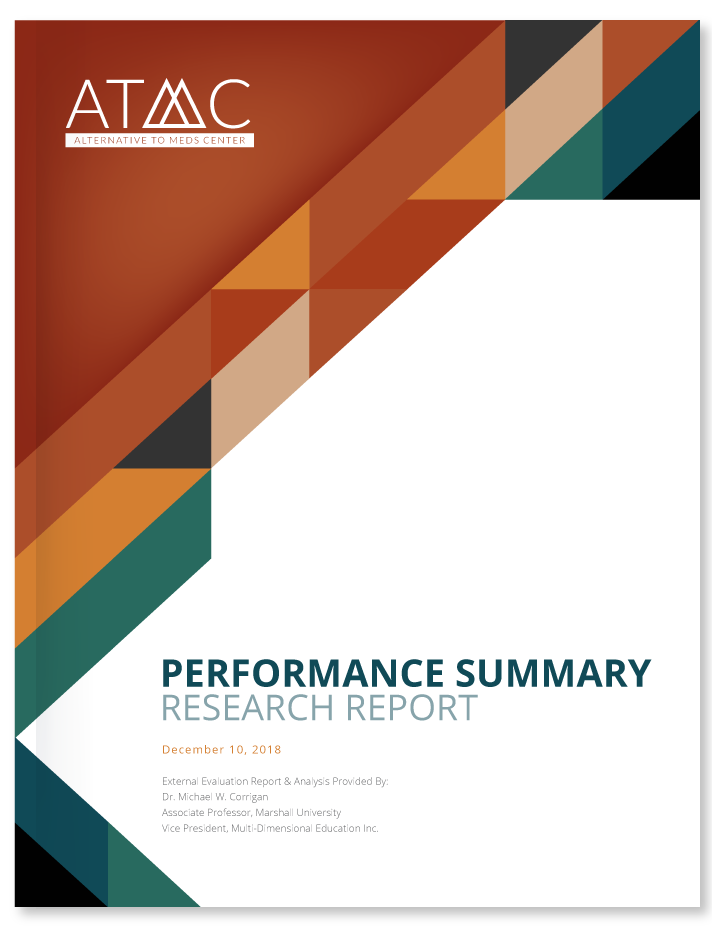
Research Question 1 (RQ1): Is treatment at ATMC effective in helping clients?
The answer is a definitive yes. And the following research questions are designed to answer in which specific ways ATMC is effective in helping clients.
RQ1a: What percentage of ATMC graduates/clients succeed in staying med free for more than six months after their residential treatment period (by pharmaceutical category)?
✓ Research documents ATMC’s success rate, for helping clients become and stay med free, to be as high as 87.5%.
 Results suggest that ATMC is experiencing great accomplishment when it comes to the success rate of helping clients discontinue the use of pharmaceuticals and remain med free for extended periods of time; ranging from six to forty-seven months.
Results suggest that ATMC is experiencing great accomplishment when it comes to the success rate of helping clients discontinue the use of pharmaceuticals and remain med free for extended periods of time; ranging from six to forty-seven months.
RQ1b: Is the reduction in medication use after ATMC treatment statistically significant?
✓ Yes. With a confidence interval of 99.9%, research documents that ATMC’s holistic treatment process can reduce with statistical significance a client’s dependency on pharmaceuticals, if not eliminate use entirely.
✓ A paired sample t-test identified statistically significant decreases in the number of medications being used from intake (M = 1.66, SD = 1.17) to discharge from ATMC (M = .63, SD = .86), t(94) = 9.43, p < .001.
✓ A paired sample t-test also identified statistically significant decreases in the number of medications being used from intake (M = 1.66, SD = 1.17) to post-test assessments gathered six to 47 months after leaving treatment (M =.63, SD = .88), t(79) = 6.33, p < .001.
Clients entering ATMC with varying degrees of pharmaceutical drug dependency reported a range of one to four categories of drugs being used inclusive mainly of benzos, antidepressants, antipsychotics, mood stabilizers, and various other pharmaceuticals (M = 1.66, SD = 1.17). At the time of discharge from ATMC, though some clients due to safety efforts encompassing drug tapering plans were still on up to four medications, the mean number of pharmaceutical drugs reported being used dropped to .63 (SD = .86). And after being away from ATMC for six months to four years, respondents reported a mean usage of .63 (less than one drug) (SD = .88). A total of 59.8% of respondents reported not taking any medications at the time of the post-test assessment. Please note, however, 20.7% reported being on one pharmaceutical medication at post-test, as well as 15.9% reporting the use of two medications and 3.7% reporting the use of three medications. Please note that medications being used at the time of post-test were identified in the vast majority of cases to be respectively less dangerous and addictive medications as well as taken in lower dosages than what clients entered ATMC being dependent upon.
RQ1c: Does the ATMC treatment process have evidence of being long-lasting?
✓ Yes. For the large percentage of clients who are able to dramatically reduce or end their pharmaceutical dependency during the ATMC treatment process, Analysis of Variance (ANOVA) performed documents that the results are long-lasting.
✓ Trending data also suggests that the more time away equates to continued reduction in pharmaceutical medication use.
To explore if the number of weeks away from ATMC after treatment had an impact on effectiveness to reduce pharmaceutical drug use, an Analysis of Variance (ANOVA) was performed. Results documented there were no statistically significant differences between clients grouped by six to 12 months, 13 to 24 months or more than 25 months, F (2, 77) = 1.28, p = .28. Considering this analysis shows no significant differences between clients six months to four years after treatment and a trend showing consistent further reduction in medication use as time has passed, the effectiveness of ATMC’s efforts show evidence of being long-lasting.
RQ1d: How does the success of ATMC treatment efforts relate to life satisfaction variables after treatment at the center?
✓ For 83.5% of clients, the improved symptom levels experienced before
graduating from ATMC have continued for six months to four years.
✓ 76.6% of ATMC clients report experiencing positive social relationships and
interactions in life after graduating.
✓ 71.4% of ATMC clients report having a fulfilling family life after graduating.
✓ 68.7% of ATMC clients report having fulfilling friendships after graduating.
✓ 77.5% of ATMC clients report having positive support systems after graduating.

RQ1e: Do clients experience quality sleep after their care at ATMC?
✓ More than 76% of ATMC graduates report experiencing quality sleep patterns continuing six months to four years after residential care.

RQ1f: What is the overall satisfaction level with ATMC services?
✓ On a scale of 1 (very dissatisfied) to 10 (most satisfied), clients reported a median score of 8; with the most frequent answer being a 10 out of 10.
End of Study
Defining the Right Evidence-Based Treatment for You
Strategic by design and logic.
There is nothing that gives us greater purpose than to provide the best type of treatment available to meet a person’s chemistry and deficiencies; reset them, and restore being into beautiful balance. We do this by implementing evidence-based treatments that complement other methodologies including holistic, integrative, individualized, and more. Though different, they coincide with one another to identify the pieces of each client’s personal health puzzle. From there, we construct a course of action focusing on reaching a collective end goal: seeing you or your loved one living free from mental anguish and chemical dependency.
Medicine is a practice that gets better through consistent study, utilization, and open interpretation.
Many clients come through our doors for an inpatient stay to remove dependency on prescribed medications, initially given as the means to address mental, physical, or behavioral health conditions. Whether it is benzodiazepines to treat anxiety disorders, or gabapentin to ease recurring symptoms of drug addiction, for example, the use of chemicals to achieve and sustain true health is a false pretense.
Consider your current state of health or the one you’re concerned about. Research shows that the longer an individual is on a medication, illegal drug, or heavy alcohol consumption, the likelihood of abusing other substances or adding more medications increases. As the body continues to experience inflammation and stress, natural systemic function is more difficult. Toxic exposures from medication, drugs, alcohol, environment and more, further compromise our ability to maintain healthy balance in mind, body and spirit.
While many well intended physicians prescribe medications to treat a variety of illness and disease, it all too often is a short-term approach searching for a long term solution that seldom comes to be. Evidence-based methods provide proven testimony to treatments.
Here’s how they work.
Evidence-Based Treatment Adds Simplicity to Personal Complexity
We continue to find that many mysteries in medicine can be unraveled by clear communication between clinician and client. What may be unimportant to a resident may be the breakthrough to a staff member. It takes conversation, research and a tenacious commitment to uncovering the truth.
In fact, evidence-based treatment is a blend of substantiated scientific findings, clinical opinion and client preference in care that converge in a recovery plan, individualized. And because each person is different biochemically, neurologically, psychologically and more, utilizing a broad scope approach with evidence-based treatments as a foundation provides more answers for more people.
Discovering the Difference in You
Diagnostics tell a personal story.
While in our care, each resident undergoes extensive laboratory testing. The purpose of this testing is to assess, investigate, and create solutions. We believe in order to truly help a person, we must first understand them. The series of diagnostic testing residents go through here at Alternative to Meds Center helps us more clearly understand the root of their symptoms.
Diagnostics extend well beyond lab testing and include looking into a person’s brain chemistry, exposure to environmental toxins, habits, experiences, as well as psychological assessments. All of this is done to ensure we are delivering the absolute best kind of recovery plan for that unique person’s situation, with the backdrop of evidence-based treatments.
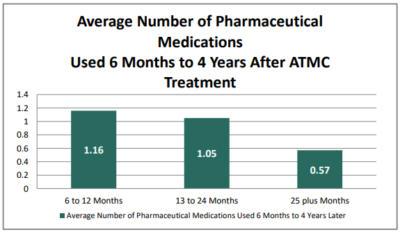
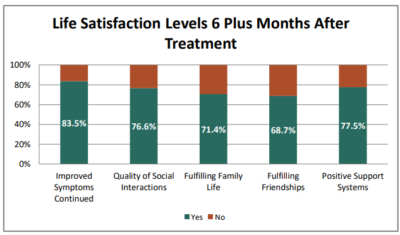
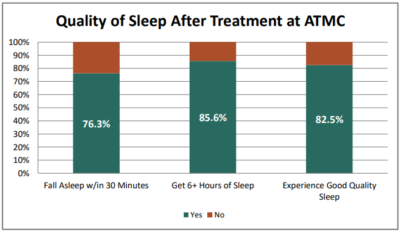
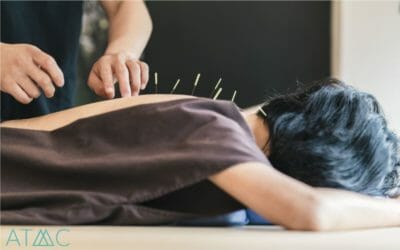 Acupuncture is an ancient modality that has been in practice for over 2500 years. It involves the use of needles to stimulate certain points on the body to balance the flow of “chi” along the meridians and help optimize the functionality of one’s organs. Acupuncture has been used for a variety of different health issues including pain management, depression, anxiety, digestive, and to treat neurological issues such as Parkinson’s disease. Studies show that acupuncture can be used successfully to treat depression, anxiety and stress, when used in conjunction with other methods.
Acupuncture is an ancient modality that has been in practice for over 2500 years. It involves the use of needles to stimulate certain points on the body to balance the flow of “chi” along the meridians and help optimize the functionality of one’s organs. Acupuncture has been used for a variety of different health issues including pain management, depression, anxiety, digestive, and to treat neurological issues such as Parkinson’s disease. Studies show that acupuncture can be used successfully to treat depression, anxiety and stress, when used in conjunction with other methods. Qigong is a form of mindful movement that encourages healing on many different levels. Qigong means creating energy, and is a system of health maintenance that results in increased vitality and healing. Qigong has been found to increase digestive, lymphatic, circulatory, respiratory, and cardiovascular functions. Those who regularly practice Qigong find that it helps them regain youthful vitality, recover from illness faster and maintain health. Western medicine has confirmed that Qigong decreases hypertension. One of the most important effects of Qigong is the reestablishment of the mind/body/soul connection. At Alternative to Meds Center, we have found that reconnecting with your body, mind, and soul is greatly helpful in overcoming mental health symptoms, substance abuse, and other problems.
Qigong is a form of mindful movement that encourages healing on many different levels. Qigong means creating energy, and is a system of health maintenance that results in increased vitality and healing. Qigong has been found to increase digestive, lymphatic, circulatory, respiratory, and cardiovascular functions. Those who regularly practice Qigong find that it helps them regain youthful vitality, recover from illness faster and maintain health. Western medicine has confirmed that Qigong decreases hypertension. One of the most important effects of Qigong is the reestablishment of the mind/body/soul connection. At Alternative to Meds Center, we have found that reconnecting with your body, mind, and soul is greatly helpful in overcoming mental health symptoms, substance abuse, and other problems.
